So, here we are with our practice set of ECCE MCQ Questions and answers. I believe these MCQs will give you in-depth insights into this global topic.
What do you say? When scientists and researchers have acknowledged the importance of early childhood care and is being discussed on global platforms like UNESCO and WHO, then definitely this topic earns much respect and requires an extra effort to settle it subconsciously in our mind. Isn’t it?

Investing in early childhood is crucial to reduce social inequalities, which begin even before birth. Increasing funding, both national and international, will make a difference for future generations.
Audrey Azoulay, UNESCO Director-General
We have covered Early Childhood Care and Education (ECCE) in great length in our previous article which can be accessed from this link “ECCE (2024): The Best Power of Play in PreSchool” where all the necessary elements are covered systematically. I appreciate those who have covered or else request you to cover before attempting this ECCE MCQ Questions.
And do follow our telegram channel for all kinds of PDFs.
ECCE MCQ Questions
(1) In NEP 2020 it is envisaged that before the age of five every child will move to a preparatory class or Balvatika which has an ECCE-qualified teacher. Balvatika is a______?
- Class before Class IV
- Class before Class I
- Class before Class II
- Class before Class III
Answer ECCE MCQ Questions
(2) Class before Class I
(2) A national curricular and pedagogical framework for early childhood care and education (NCPFECCE) for children up to the age of _______will be developed by ___________.
- 2 and NCERT.
- 8 and NCERT.
- 3 and NCTE.
- 8 and NCTE.
Answer ECCE MCQ Questions
(2) 8 and NCERT.
(3) Early years are critical in any child’s life span since the_______ is more rapid than at any other stage of development.
- Rate of development.
- Rate of life.
- Rate of speed.
- Rate of growth
Answer
(1) Rate of development.
(4) The ECCE Training of Anganwadi workers and teachers will be_______ by the cluster resource centers of the school education department.
- Mentored.
- Evaluated.
- Coached.
- Conducted.
Answer ECCE MCQ Questions
(1) Mentored.
(5) Activities requiring running, jumping, balancing, and cycling should be provided for
- Fine Muscle Development.
- Eye-hand coordination.
- Large muscle development.
- Stability.
Answer ECCE MCQ Questions
(3) Large muscle development.
(6) Activities like cutting, pasting, tearing, stringing the beads, fixing the puzzles, playing with blocks, and playing with clay, sand, and water lead to
- Fine Muscle Development.
- Eye-hand coordination.
- Large muscle development.
- Stability.
Answer ECCE MCQ Questions
(1) Fine Muscle Development.
(7) When a child expresses and manages their emotions, can establish positive and rewarding relationships with others, and can explore and engage with the environment. which type of development is it?
- Language and literacy development.
- Socio-emotional development.
- Physical and motor development.
- Aesthetic development.
Answer ECCE MCQ Questions
(2) Socio-emotional development.
(8) Which of the following statements about Early Childhood Care and Education (ECCE) in India is correct?
- The Right of Children to Free and Compulsory Education Act does not acknowledge the importance of ECCE.
- The Indian Government has mandated the provision of ECCE for all children until they reach six years of age through the amendment of Article 45 of the Indian Constitution.
- Quality ECCE is accessible to all young children in India.
- The Right of Children to Free and Compulsory Education Act was implemented on April 1, 2015.
Answer ECCE MCQ Questions
(2) The Indian Government has mandated the provision of ECCE for all children until they reach six years of age through the amendment of Article 45 of the Indian Constitution.
(9) What does ECCE encompass, fostering both intellectual and physical development in young learners?
- Alphabets and language
- Numbers and counting
- Colors and shapes
- Indoor and outdoor play, puzzles, drawings, painting, and other visual arts, crafts, music, etc.
Answer ECCE MCQ Questions
(4) Indoor and outdoor play, puzzles, drawings, painting, and other visual arts, crafts, music, etc.
(10) Assertion: The administration of Early Childhood Care and Education (ECCE) involves coordination among multiple ministries, including the Ministries of Human Resource Development (MHRD), Health and Family Welfare (HFW), Women and Child Development (WCD), and Tribal Affairs.
Reason: These ministries collectively oversee various aspects of ECCE, ensuring its multifaceted and holistic approach to fostering children’s development.
- Both assertion and reason are true, and the reason is the correct explanation of the assertion.
- Both assertion and reason are true, but the reason is not a correct explanation of the assertion.
- Assertion is true, but the reason is false.
- Both assertion and reason are false.
Answer ECCE MCQ Questions
(1) Both assertion and reason are true, and the reason is the correct explanation of the assertion.
(11) Which of the following is a key objective in early childhood care and education (ECCE)?
- Ensuring optimal outcomes in various domains of development such as physical, motor, cognitive, socio-emotional, and language development.
- Imbibing good nutrition routines, health habits, and hygiene practices in children.
- Developing a sense of aesthetic appreciation and stimulating creative learning processes in school.
- All of the above
Answer ECCE MCQ Questions
(4) All of the above
(12) Assertion (A): The Government of India has taken several initiatives to improve the quality and accessibility of Early Childhood Care and Education (ECCE).
Reason (R): The Government of India has implemented initiatives such as SAKSHAM Anganwadi and POSHAN 2.0, the Integrated Child Development Scheme (ICDS), Strengthening Teaching-Learning and Results for States (STARS) Project, and National Education Policy (NEP) 2020.
- Both A and R are true and R is the correct explanation of A.
- Both A and R are true but R is not the correct explanation of A.
- A is true but R is false.
- A is false but R is true.
Answer ECCE MCQ Questions
(1) Both A and R are true and R is the correct explanation of A.
The Government of India has indeed implemented several initiatives, as mentioned in the reason, to improve the quality and accessibility of ECCE.
(13) According to the National Education Policy (NEP) 2020 in India, which of the following is NOT a requirement for an Early Childhood Care and Education (ECCE) center?
- No child would be subjected to an admission test, written or oral for granting admission to an ECCE center.
- ECCE program is of 2 to 3 hours duration.
- One classroom measuring at least 35 square meters for a group of 30 children, and availability of adequate 30 square meters of outdoor space for a group of 30 children.
- Medium of instruction must be the mother tongue and local language.
Answer ECCE MCQ Questions
(3) One classroom measuring at least 35 square meters for a group of 30 children, and availability of adequate 30 square meters of outdoor space for a group of 30 children
(14) NEP proposed that universal provisioning of quality early childhood development, care, and education must be achieved. What is the timeline for this?
- 2020.
- 2030.
- 2040.
- 2050.
Answer ECCE MCQ Questions
(2) 2030.
(15) In the longer term state government shall prepare cadres of professionally qualified educators for early childhood care and education through?
- Stage-specific professional training.
- Mentoring mechanism.
- Career mapping.
- All of the above.
Answer ECCE MCQ Questions
(4) All of the above.
(16) Which of the following statements best describes the need and importance of Early Childhood Care and Education (ECCE)?
- ECCE programs help children acquire age-appropriate knowledge and skills, enabling them to adjust better to a formal school environment.
- ECCE can reduce the risk of developmental delays, malnutrition, and diseases that can impair a child’s brain function.
- Both 1 and 2.
- None of these.
Answer ECCE MCQ Questions
(3) Both 1 and 2.
(17) Which of the following statements best describes the role of play in a child’s development?
- Play provides a learning opportunity to all children during their formative years for their overall development and enriches a child’s brain, body, and life.
- Play can be sensory, neuromuscular, cognitive, or any combination and involves repetition of exercise, exploration, experimentation, and imitations of one’s surroundings.
- Infants enjoy playing with the parent’s fingers & face and their body parts, playing in the water, and games like peek-a-boo.
- All of these.
Answer ECCE MCQ Questions
(4) All of these.
(18) Assertion (A): The Government has proposed to roll out the ECCE program in all Anganwadi centers in a phased manner beginning the financial year from 2021 to 2022 and plans to cover up to 20% of the Anganwadi centers each year over the next five years.
Reason (R): The Government aims to create a blueprint to modernize Anganwadis and strengthen them as early childhood institutes to ensure universal access to ECCE. For this, 2,00,000 Anganwadi centers are created named as “Saksham Angadwadi’s”.
- Both A and R are true and R is the correct explanation of A.
- Both A and R are true but R is not the correct explanation of A.
- A is true but R is false.
- A is false but R is true.
Answer ECCE MCQ Questions
(1) Both A and R are true and R is the correct explanation of A.
The government’s plan to roll out the ECCE program in all Anganwadi centers and its plan to cover up to 20% of the Anganwadi centers each year over the next five years (Assertion A) is a part of its larger aim to modernize Anganwadis and strengthen them as early childhood institutes to ensure universal access to ECCE (Reason R). Therefore, R is the correct explanation of A.
(19) John has been practicing number recognition with various tools such as jumbo cards, dot flashcards, building blocks, and plastic numbers. He also engaged in play dough activities and number-matching activities. If John sees the number ‘15’ on a jumbo card, which of the following is the correct representation of the number ‘15’ on a dot flashcard?
- Fifteen dots are arranged in three rows, with five dots in each row.
- Fifteen dots are arranged in five rows, with three dots in each row.
- Fifteen dots are arranged in two rows, with seven and eight dots in each row respectively.
- Fifteen dots are arranged randomly.
Answer ECCE MCQ Questions
(1) Fifteen dots are arranged in three rows, with five dots in each row.
(20) Sarah has been practicing alphabet recognition with various tools such as flashcards, building blocks, and plastic letters. She also engaged in play dough activities and alphabet-matching activities. If Sarah sees the letter ‘B’ on a flash card, which of the following is the correct representation of the letter ‘B’ on a building block?
- A block with the letter ‘A’.
- A block with the letter ‘B’.
- A block with the letter ‘C’.
- A block with the number ‘2’.
Answer ECCE MCQ Questions
(2) A block with the letter ‘B’.
(21) According to NEP 2020 Anganwadi should be in the radius of
- 3-10 km.
- 5-10 km.
- 3-6 km.
- 5-8 km.
Answer ECCE MCQ Questions
(2) 5-10 km.
(22) SDG aims to ensure that all girls and boys including those belonging to disadvantaged groups and with special needs have access to quality early childhood development care pre-primary education.
- 2025.
- 2030.
- 2028.
- 2032.
Answer ECCE MCQ Questions
(2) 2030.
(23) How is the Government mainly providing services through an integrated style development center?
- Play School.
- Anganwadi.
- Balvatika.
- Preschool.
Answer ECCE MCQ Questions
(2) Anganwadi.
(24) ECCE in our country is delivered through early childhood education institutions consisting of
- Stand alone on Anganwadi and preschool.
- Anganwadi is co-located with a primary school.
- Pre-primary school section covering at least age 5 to six years co-located with the existing primary school.
- All of these.
Answer ECCE MCQ Questions
(4) All of these.
(25) LSRW and ___________are Among the most important skills children learn under ECCE.
- Literacy.
- Language.
- Numeracy.
- Activities.
Answer ECCE MCQ Questions
(3) Numeracy.
(26) The midday meal program will also be extended to the Balvatika in primary schools as per________?
- NCF 2005.
- NEP 1986.
- NEP 2020.
- Both 2 and 3.
Answer ECCE MCQ Questions
(3) NEP 2020.
(27) Under ECCE SAFAL key stage assessments should be conducted in classes______?
- 3, 4, and 5.
- 3, 4, and 8.
- 3, 5, and 8.
- 1, 3, and 6.
Answer ECCE MCQ Questions
(3) 3, 5, and 8.
(28) The planning and implementation of the ECCE curriculum will be carried out jointly by the Ministry of Education(MOE), Women and Child Development (WCD), Health and Family Welfare (HFW), and______?
- NCERT.
- SCERT.
- NIOS.
- Tribal affairs.
Answer ECCE MCQ Questions
(4) Tribal affairs.
(29) In what year was the national ECCE policy implemented?
- 1975
- 2000
- 2013
- 2020
Answer ECCE MCQ Questions
(3) 2013
(30) Identify the core objective of early childhood care education curriculum for the children of four to six years.
- Early stimulation.
- Learn while you play.
- School readiness.
- Home substitute.
Answer ECCE MCQ Questions
(2) Learn while you play.
(31) Which article of the Indian Constitution states that the State shall endeavor to provide ECCE for all children until they complete the age of six years?
- Article 44.
- Article 45.
- Article 46.
- Article 47.
Answer ECCE MCQ Questions
(2) Article 45.
(32) When developing an ECCE curriculum, what is one thing that should be ensured?
- Important learning and domain-based areas are covered.
- Formal learning areas are covered.
- Cognitive learning is covered.
- Socio-emotional learning is covered.
Answer ECCE MCQ Questions
(1) Important learning and domain-based areas are covered.
(33) What should be the language of communication in an ECCE program?
- National language.
- State language.
- Mother tongue language.
- English and Hindi.
Answer ECCE MCQ Questions
(3) Mother tongue language.
(34) In ECCE, the mathematical concept ideally consists of flexible and play-based, learning concepts which comprise of________.
- Counting and coloring.
- Numbers, counting, shapes.
- Edition and Subtraction
- Geometry.
Answer ECCE MCQ Questions
(2) Numbers, counting, shapes.
(35) At the ECCE center which method should be used to Orient Children in the classroom settings?
- Family-focused.
- Child-centered.
- Textbook oriented.
- Teacher centered.
Answer ECCE MCQ Questions
(2) Child-centered.
(36) Anita has just completed her schooling. She wants to be an early childhood professional. Suggest a suitable course from the following, which will help her in fulfilling her dream.
- Diploma in HR.
- Diploma in ECE.
- Postgraduate Diploma in ECE.
- Diploma in nutritionist.
Answer ECCE MCQ Questions
(2) Diploma in ECE.
(37) Points of contact for sharing information under ECCE include.
- Drop and pick up time of a child.
- Home events by ECCE providers.
- Accessing emotional, behavioral, and social.
- Parent’s participation in classroom
- Only 1,2,3.
- Only 2,3,4.
- Only 3,4,1.
- Only 4,1,2.
Answer ECCE MCQ Questions
(3) Only 3,4,1.
(38) ECCE provider have to maintain________and_________ When sharing information.
- Descriptive and subjective.
- Test and exams.
- Speed and performance.
- Positivity and specificity.
Answer ECCE MCQ Questions
(4) Positivity and specificity.
(39) How can early childhood care teachers best train children to develop moral values?
- Setting up clear rules and setting strict boundaries.
- Through continuously modeling the child’s behavior through role plays.
- Involving children in punishable and difficult situations forces them to learn from experiences.
- Giving reward and punishment.
Answer ECCE MCQ Questions
(2) Through continuously modeling the child’s behavior through role plays.
(40) The early childhood care and education is also known as?
- Beginning childhood education.
- Infantry education.
- Nursery education.
- Kindergarten education.
Answer ECCE MCQ Questions
(4) Kindergarten education.
(41) The theory of learning process and social behavior used in ECCE curriculum that proposes new behaviors can be acquired by observing and imitating others
- Cognitive learning theory
- Attachment theory.
- Social learning theory.
- Psychoanalytical theory
Answer ECCE MCQ Questions
(3) Social learning theory.
(42) The tools for assessing children’s development in the ECCE school setting should be based on?
- Need and developmental level.
- Curriculum.
- Co-curricular.
- Life history.
Answer ECCE MCQ Questions
(1) Need and developmental level.
(43) Mrs Verma wants to open up a preschool in her locality. Which guiding principles of ECCE should be considered by her?
- A blend of textual and cultural resources.
- Use of Fancy materials.
- Focus only on nutritious meals.
- Promoting difficult tasks.
Answer ECCE MCQ Questions
(1) A blend of textual and cultural resources.
(44) According to the NCF (2005), which of the following is not a guiding principle of ECCE?
- Learning is fundamentally rooted in play.
- Education is fundamentally grounded in art.
- A combination of formal and informal exchanges.
- Preparation for school.
Answer ECCE MCQ Questions
(4) Preparation for school.
(45) Which of the following is an incorrect statement while creating a physical environment for children’s play in ECCE?
- Activity interest areas for free small group play.
- Thoughtfully and carefully planned daily schedule.
- Adequate space for playing activities
- Limited toys and play learning materials for a group of children.
Answer ECCE MCQ Questions
(4) Limited toys and play learning materials for a group of children.
(46) Which among the following is not an interesting area in an Anganwadi or preschool? Ecce MCQ Questions
- Block building area.
- Rooftop area.
- Circle time area.
- Doll’s dramatic area.
Answer ECCE MCQ Questions
(2) Rooftop area.
(47) Which among the following is not considered while planning for Anganwadi children around 3 developmental goals?
- Planned with objectives in mind but flexible for need-based variations
- Anganwadi worker-centric activities should be given priority.
- The three developmental goals should guide the classroom process and continuous observation and assessment of children’s play and learning.
- Time scheduling for activities and daily schedules.
Answer ECCE MCQ Questions
(2) Anganwadi worker-centric activities should be given priority.
(48) Under ECCE, which of the following is not a part of circle time area activity?
- Sketching.
- Storytelling.
- Music.
- Indoor movement games.
Answer ECCE MCQ Questions
(1) Sketching.
(49) The Anganwadi worker or preschool teacher must ensure that the outdoor space for the children must be.
- Adventurous.
- Stimulating.
- Daring.
- Challenging.
Answer ECCE MCQ Questions
(2) Stimulating.
(50) What is the other name of the manipulative area in preschool or Anganwadi?
- Mathematics area
- Block building area.
- Circle time area
- Reading area.
Answer ECCE MCQ Questions
(1) Mathematics area.
Please let us know through the comment section if you want any topic to be discussed in this blog. We will try to provide an article on that subject as early as possible.
Please leave your valuable comment in the comment box! Your comments are valuable to us.
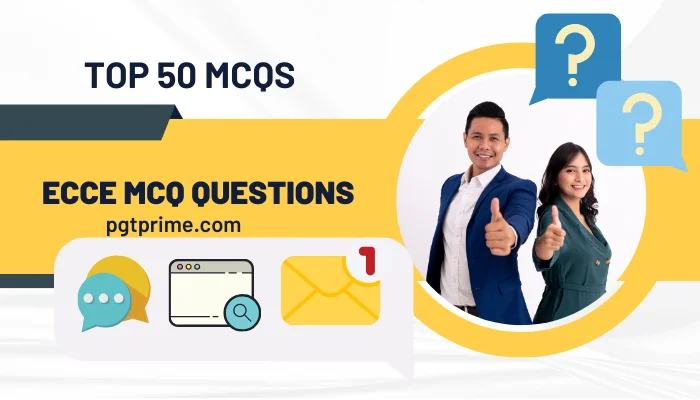


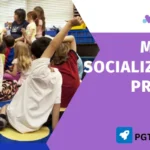
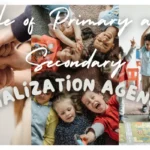


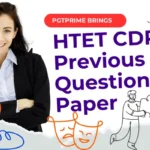
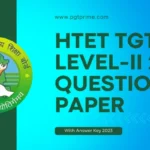



Give me some More question and answer in early chilhood to educate my students .
Thankyou very much for supportive above question and answers which is very valuable for work.
Very useful. Thank you. Need more questions on play.